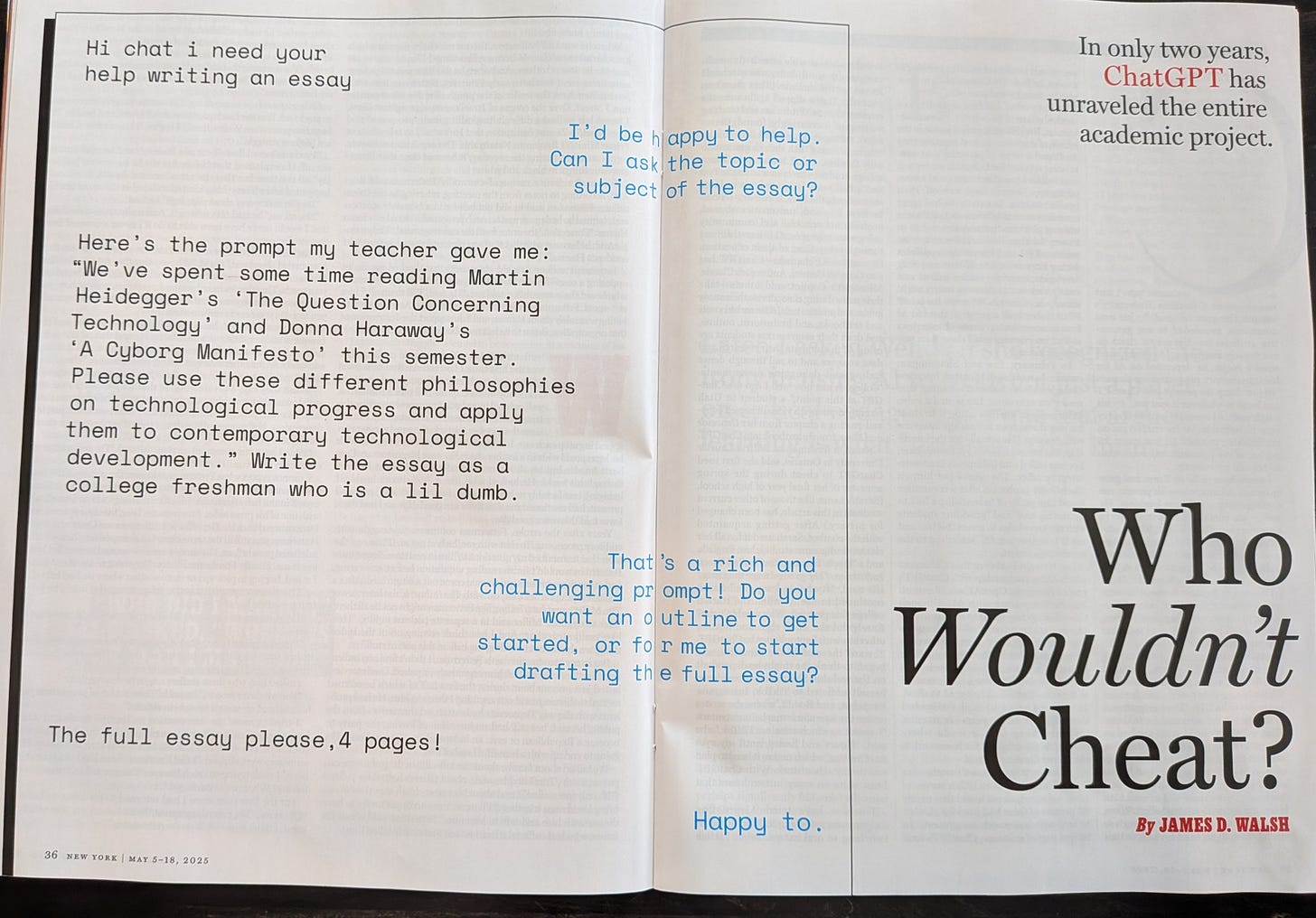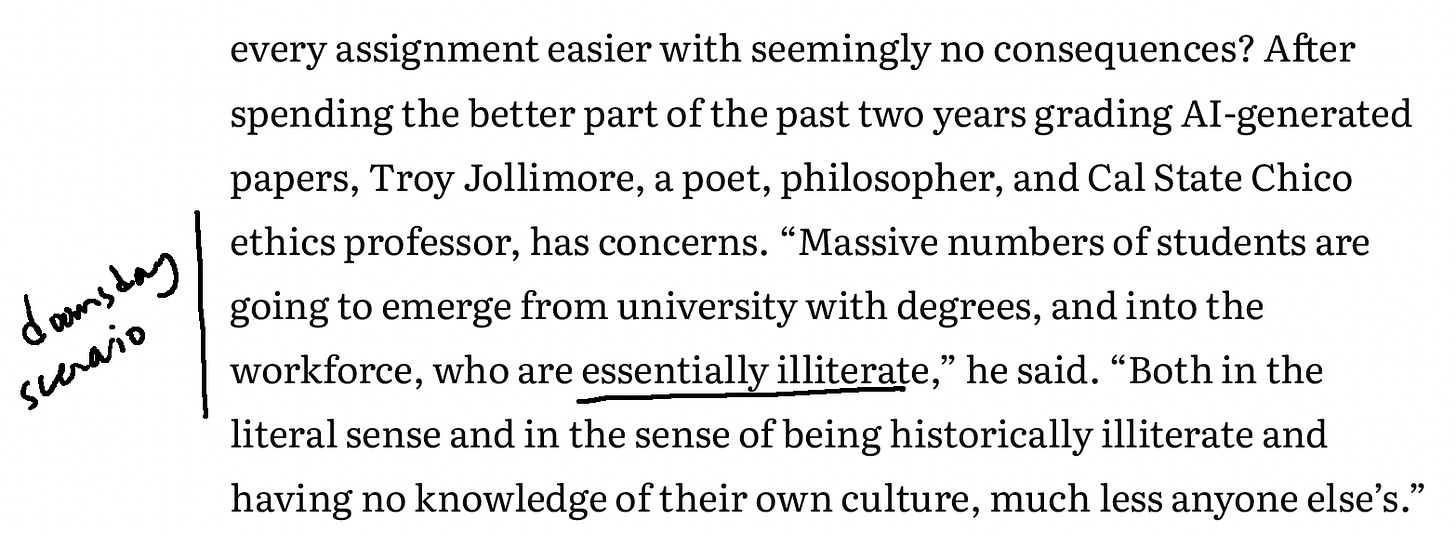#494: Who Wouldn’t Cheat?
Plus: Sign up to discuss “Solar Bros,” our article of the month, on June 1
Hi Loyal Readers. I have two things for you this week:
An invitation to discuss “Solar Bros,” our article of the month
This is the story of a young man who quits college to make it big as a door-to-door solar panel salesperson. I loved the article because it explores masculinity, race, capitalism, corporate manipulation, higher education, spirituality, and the American dream. We’re meeting on Zoom on June 1, 2:00 - 3:30 pm PT. Here’s more info. The point of these discussions is to connect with other thoughtful readers about articles that resonate with us. It’d be great to have you there. Click on the button below to sign up.
My take on “Who Wouldn’t Cheat?” — this week’s featured article
I couldn’t put this one down. Published in New York Magazine (a publication that to me is half The New Yorker, half BuzzFeed), this piece explores how artificial intelligence has taken college students by storm. ChatGPT is spreading so fast, author James D. Walsh writes, that “the entire academic project” might unravel before our very eyes. (Critics scoffed, calling the article clickbait.)
Scroll down to read my thoughts on the article, dive into my handwritten highlights and annotations, preview some of the piece’s juiciest quotes, and get access to the gift link. Or if you trust me, click on the button below to get right to reading the article.
Who Wouldn’t Cheat?
by James D. Walsh • New York Magazine • 21 min • Gift Link • My Annotations
This year, I’m teaching a section of Honors Humanities 11. It’s been fun. My students are close readers and deep thinkers. But in the Fall, I couldn’t tell if they were strong writers. This is because on the first assignment, I let them write their responses at home. Not a great idea on my part. The essays I got back weren’t exactly ChatGPT, I concluded. But they were weird.
I talked with my students. We had a good conversation. They told me they agreed with my definition of cheating. We discussed scenarios: What was the line between responsible and irresponsible use of artificial intelligence? All was good. I left our conversation with a renewed trust of my students.
But that didn’t matter. I just couldn’t handle the nuance. I caved. The next assignment was in person, handwritten. And you know what? It was beautiful. We haven’t looked back. I can confidently say that my students and I are engaged in an authentic pursuit to improve their writing. What they give me is true and real. And the support I provide, they say, is helpful. I think it’s because it’s genuine.
I tell you that story as a way to introduce this week’s article, “Who Wouldn’t Cheat?” by James D. Walsh. If you’ve subscribed to Article Club for a while, you know that I’ve been interested in articles about the rise of artificial intelligence, the decline of college, and the end of reading. This article puts these trends together. In short, Mr. Walsh reports that ChatGPT is so pervasive that it shouldn’t be a shock that 90 percent of college students are using it. AI is so powerful, he adds, that pretty soon, the whole enterprise will be computers: a bot will turn in work, another bot will grade the work; the student will get a diploma, the professor will get paid.
A few of my annotations
Because I liked this article so much, I decided to read it a second time and add some handwritten annotations. You can read them below.
(Ironic plot twist: Adobe Acrobat just implored me to “save time” and asked me if I wanted an AI summary of the article.)
What stood out most was Mr. Walsh’s reporting — specifically, his ability to find students who unabashedly do not care that they’re using AI to get through college. The main character, Chungin “Roy” Lee, calls academic work “irrelevant,” “hackable by AI,” and utterly “uninteresting.” College isn’t for intellectual pursuit, Mr. Lee says. It’s to find your romantic partner and your business partner.
Sarah was one of my favorites. Once she began using ChatGPT, she found that her grades went up. This gave her more time for social media, while saving her eyes from unnecessary screen time:
I also liked Wendy, who likes writing, but would rather get good grades. While she appreciates the process that goes into understanding a prompt and organizing her thoughts into an outline, Wendy prefers ChatGPT because “you just don’t really have to think that much.”
This is because college has become transactional, Mr. Walsh writes. In a recent Deloitte survey, only one half of college graduates said their education was worth the money, compared with three-fourths of trade-school graduates.
Professors in the piece are feeling the pressure. One response is to blame young people, calling them lazy, while at the same time wishing nostalgically for the past, when they too hated writing essays, but still wrote them, because pain and suffering amount to value. (Which got me thinking: I write every word of this newsletter, and it’s never easy, and sometimes I feel like a very slow version of a Large Language Model, just trying to find the next word.)
If professors are not complaining about students, they’re predicting general doom. If college students use AI, they won’t know how to read and write (on their own), and they won’t understand their history, and our society will fall apart.
I tend to agree with this sentiment, but that’s mostly because I like to read and write. Besides, professors have been lamenting their students’ skills for generations. That’s what adults do. But this is different, they say. AI is a different beast. We must eliminate it from college, some professors say (even if they’re using AI themselves). Others say that AI is inevitable; we must adapt and re-invent what college is and what it’s for.
You can probably tell that this article took me on a roller coaster of emotions. I think that’s what Mr. Walsh wanted. His reporting was sharp; his characters were stark; his quotations were juicy. Let’s just say that I’m happy I graduated from college long ago, in a much simpler time, when Google Search was the new thing. (Yes, that’s my nostalgia coming through.)
One last thing: I’m attending my niece’s graduate school commencement today. I’m very proud. Attending will be her grandmother, who wrote her college essays on a manual typewriter (with correction ribbon), her parents, who used a computer with no Internet, and her peers, many of whom may have earned their prestigious degree, at least in part, by telling a bot to do the work for them. (My niece would never do such a thing!)
Thank you for reading and listening to this week’s issue. Hope you liked it. 😀
To our 6 new subscribers — including Mihriban, Ashley, Amandine, JoAnne, Lex, and Andrea — I hope you find the newsletter a solid addition to your email inbox. Welcome to Article Club. Make yourself at home. 🏠
If you appreciate the articles, value our discussions, and have come to trust that reading Article Club is better for your mind and soul than your current habit of scrolling the Internet for hours on end (or avoiding reading altogether, hoping the world will vanish), please consider a paid subscription. It’s $5 a month or $36 a year.
If subscribing is not your thing, don’t despair: There are other ways you can support this newsletter. Share the newsletter with a friend or buy me a coffee for $3 (so I can read more articles).
On the other hand, if you no longer want to receive this newsletter, please feel free to unsubscribe below. See you next Thursday at 9:10 am PT.













More time for Tiktok, a cold stake through my heart. As an academic who has been slogging through AI-generated papers all month, this one felt too close to home. You mark with suspicion rather than a hope of a moment of insight - even if it's clunkily worded or buried in the conclusion.
I always enjoy it when you share your annotations, Mark.